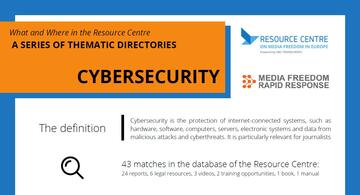
curated by Paola Rosà
What and Where in the Resource Centre
CYBERSECURITY
curated by Anna Zanon and Paola Rosà
The Definition
Cybersecurity is the protection of internet-connected systems, such as hardware, software, computers, servers, electronic systems and data from malicious attacks and cyberthreats. It is particularly relevant for journalists.
43 matches in the database of the Resource Centre: 24 reports, 6 legal resources, 3 videos, 2 training opportunities, 1 book, 1 manual.
The Policy of the European Union
The existing rules on the security of network and information systems (NIS Directive), have been the first piece of EU-wide legislation on cybersecurity and paved the way for a significant change in mind-set, institutional and regulatory approach to cybersecurity in many Member States. The New EU’s Cybersecurity Strategy was launched on 16 Dec. 2020
Out of the 4 chapters of the Recommendation on the protection, safety and empowerment of journalists, one is devoted to Online safety and digital empowerment: relevant national cybersecurity bodies should, upon request, assist journalists, and Member States should promote a regular dialogue between such cybersecurity bodies, media and industry.
Research and analysis
The reports digested in the RC include
- country-specific analysis: Turkey, Central and South-East Europe, Finland, Germany, Serbia, Ireland
- regional overviews: "New digital threats" by CMPF, The CoE Annual Report, The MMF Report 2021, The EP study on the Action Plan
- global overviews: The Reuters Digital News Report, Freedom on the Net 2021, Journalism, Media, and Technology Trends and Predictions 2021, Information Manipulation, Freedom in the World 2022, Unsafe for Scrutiny
- thematic focus: Media Freedom Violations under Covid-19, Surveillance and Human Rights, Internet Shutdowns, Combating gender-based violence, Protecting sources and whistleblowers in a Digital Age
Advocacy
The attention to surveillance recurs in dozens of letters and statements addressing the issue for example in Greece (after spyware surveillance of journalist Thanasis Koukakis), Turkey (for the growing digital censorship), Hungary (for the Pegasus scandal), Italy (after the wiretapping of Nancy Porsia), Portugal (with four journalists under police surveillance).
Tags: Cybersecurity
This content is part of the Media Freedom Rapid Response (MFRR), a Europe-wide mechanism which tracks, monitors and responds to violations of press and media freedom in EU Member States and Candidate Countries. The project is co-funded by the European Commission.


